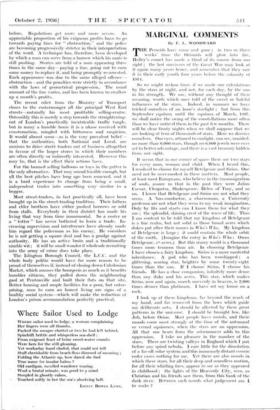MARGINAL COMMENTS
By E. L. WOODWARD
THE Perseids have come and gone ; in two or three weeks' time the Orionids will glow into lire. Halley's comet has made a third of its course from our sight ; the Jast survivors of the Great War may look at it again many years hence, and remember that they saw it in their early youth four years before the calamity of 1914.
So we might reckon time, if we made our calculations by the stars at night, and not, for each day, by the sun in his strength. We use, without any thought of their meaning, words which once told of the sweet or baleful influences of the stars. Indeed, in summer we have tricked ourselves of an hour's starlight ; but from this September equinox until the equinox of March, 1937, we shall notice the swing of the constellations more often than we have noticed them in the past few months. There will be clear frosty nights when we shall suppose that we are looking at tens of thousands of stars. Here we deceive ourselves. Our eyes, attuned to sunlight., can see, unaided, no more than 6,000 stars, though no 6,000 jewels were ever set to better advantage, and there is a vast treasury hidden from our sight.
It seems that in our corner of space there are two stars for every man, woman and child. When I heard this, I resolved to choose for myself Betelgeuze and Sirius. One need not be over-modest in these Matters. Most people, at least most Europeans, who believe in the transmigration of souls, assure us that in the past they were Julius Caesar, Cleopatra, Shakespeare, Helen of Troy, and so on. I know that Betelgeuze and Sirius are not what they seem. A 'bus-conductor, a charwoman, a University professor are not what they seem to my weak imagination. Only by fits and starts can I know them for what they are ; the splendid, shilling crest of the wave of life. Thus I am content to be told that my kingdom of Betelgeuze is a fine realm, but not solid as those broad acres which dukes put after their names in Who's Who. My kingdom of Betelgeuze is large ; it could contain the whole orbit of the earth. (Imagine the entry in Who's Who : Owns Betelgeuze, xn acres.) But this starry world is a thousand times more tenuous than air. In choosing Betelgeuze I have chosen a fairy kingdom. Sirius is a more masterful inheritance. A god who has been worshipped ; a glittering, searing star, brighter by some twenty-eight times than the sun. If I choose Sirius, • I choose his friends. He has a close companion, infinitely more dense than any duke and his acres. This star, which makes Sirius, now and again, march unevenly in heaven, is 2,000 times denser than platinum. I have set my house on a rock.
I look up at these kingdoms, far beyond the reach of my hand, and far removed from the laws which guide my deliberate acts. I should be affected by these great patterns in the universe. I should be brought low, like Job, before Orion. Most people have moods, and theie Moods come most strongly at the time of the autumnal or vernal equinoxes, when the stars are an oppression. All that one hears from the astronomers adds to this oppression. I take no pleasure in the number of the stars. There are twisting valleys in England which I put before any spiral nebula. I care little for the dissolution of 'a far-off • solar system and this immensely distant cosmic order cares nothing for me. Yet there are also moods in which these stars, for all their deep and soundless motion, for-all- their whirling fires, appear to me as they appeared in childhoOd ; the lights of the HeaVenly City, seen,' as Christian and his friends saw them, fr6m this bank of the j datk river. BetWeen such moods what judgement ant I to make ?










































 Previous page
Previous page